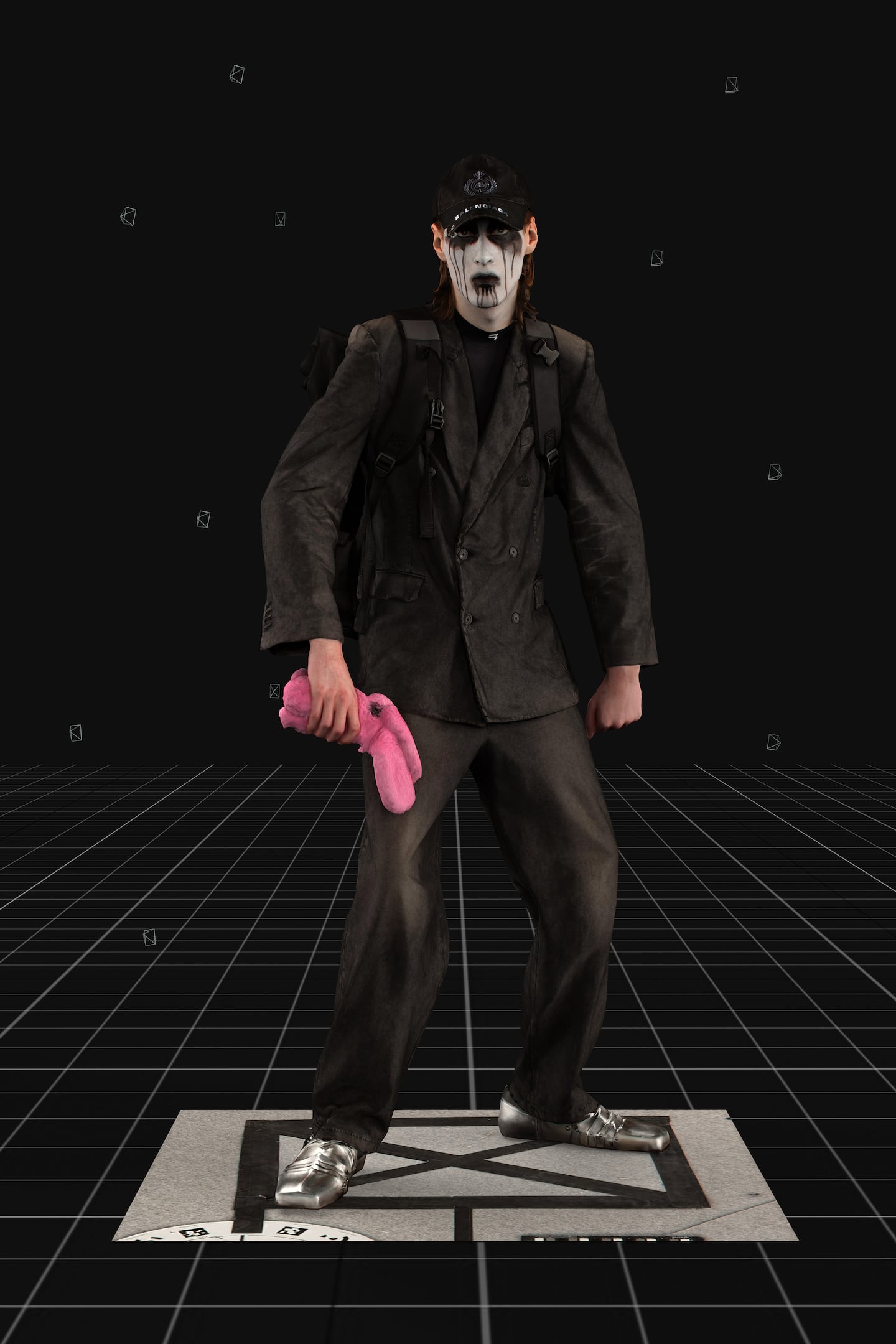
The Business of Fashion
Agenda-setting intelligence, analysis and advice for the global fashion community.

Agenda-setting intelligence, analysis and advice for the global fashion community.

Last November, New York Magazine did some crystal-ball-gazing with an issue titled “The Weirdness is Coming.” In one prescient piece, journalist Max Read wrote that “the Internet doesn’t seem to be turning us into sophisticated cyborgs so much as crude medieval peasants entranced by an ever-present realm of spirits and captive to distant autocratic warlords.” That was before 2020′s fires and floods and tyranny, all against the global canvas of a raging pandemic. And the subsequent digital do-wah-diddy-diddy was quite enough to breed neo-medieval superstition in the most rational mind.
Demna Gvasalia’s invitation to his virtual show for Balenciaga Autumn 2021 was a personalised letter inked on what looked like a piece of parchment and fragranced with “a smell-molecule reproduction of earth, soil and musty ground… the way dry earth smells after it rains,” specially created for Balenciaga by scent artist and archivist Sissel Tolaas. I have no way of knowing whether Gvasalia read Max Read’s article, but that smell irresistibly drew me towards “neo-medieval” as a label for his new collection. The last look of 50 was muse Eliza Douglas, channeling Joan of Arc in a suit of armour (although Max Read did point out that the 21st century already has its female teenage visionary in the person of Greta Thunberg). In the videogame that accompanies the launch of the collection, the armoured Douglas brandishes a long sword. She is a consummate #MeToo ambassador for Gvasalia’s fusion of past, present and future.
Oh yes, there is a Balenciaga videogame, Afterworld: The Age of Tomorrow. During BoF’s VOICES event last week, multi-player gaming firm Improbable’s co-founder Herman Narula said that resistance was futile to gaming as the future of everything. I quailed. Here, in a glimpse of that future, you could choose your avatar from the show lineup and embark on your “hero’s journey,” through teeming streets, a forest, a rave and, eventually, a mountain-top, where transformative surprises waited. Gvasalia’s life experience has been a lesson in the uses and abuses of power. Fashion may have armoured him. That is, at least, how he described it in his notes, and how he offered it in his new collection. Sometimes it was as literal as the pointy chevalier shoes, or the articulated gauntlets and thigh boots, equally articulated, like a knight’s legwear, made, according to the notes, exactly as they would have been seven centuries ago but using a silvery lacquered material, much lighter than the original steel. Other times, it was a dress sequined with scales (dragon scales?) or dripping with icicles of fringe, what you might wear for New Year’s Eve in the Kingdom of the North.
Past, present and future… Gvasalia has a better grasp on this fusion than many of his peers. He has known the worst of men, so dystopia holds no surprises for him. To survive, he’s had to find light in the darkness. That’s why, as gothic and grim as the presentation of this collection was, it was also rooted in pro-action in the face of the climate crisis which relentlessly moves on, heedless of the global preoccupation with the pandemic. Its substance was the furiously perverse marriage of salon and street that Gvasalia has made his own at Balenciaga — the voluminous satin trench vs. the message hoodie, the BLCNG corporate branding vs. the call to FREEdom — but this time, a lot of the clothes looked aged, like stuff that had stood the test of time. Not disposable, in other words. And then there was the repurposing, a checked blanket turned asymmetrical hoodie or the recycled fabric shredded by laser to mimic the texture of fur. The message was clear: clothes endure, you can’t throw them away. Gvasalia showed jeans that were distressed to the point of annihilation, but he showed them with armour bursting through the rips.
And now I go leftfield. Just last night, I was watching Ridley Scott’s “Raised by Wolves,” set a hundred years in the future, with the Knights of the Mithra, Crusader crosses on their uniforms, evangelizing in outer space for what they were convinced was the one true faith. Like I said, neo-medievalism is… a thing. Gvasalia embodied the idea by conjoining The Knight (bottom) and The Astronaut (top) in a single outfit (Look 40). It was impressive and spectacular and everything, but I was looking at this on Oculus, Facebook-owned. I already feel enough like a digital serf with my Instagram account. I don’t want to be drawn any more than I already am into the web of our feudal overlords, Facebook, Google and Amazon. I refuse to be gamed to my grave. Or is it already too late?
From where aspirational customers are spending to Kering’s challenges and Richemont’s fashion revival, BoF’s editor-in-chief shares key takeaways from conversations with industry insiders in London, Milan and Paris.
BoF editor-at-large Tim Blanks and Imran Amed, BoF founder and editor-in-chief, look back at the key moments of fashion month, from Seán McGirr’s debut at Alexander McQueen to Chemena Kamali’s first collection for Chloé.
Anthony Vaccarello staged a surprise show to launch a collection of gorgeously languid men’s tailoring, writes Tim Blanks.
BoF’s editors pick the best shows of the Autumn/Winter 2024 season.